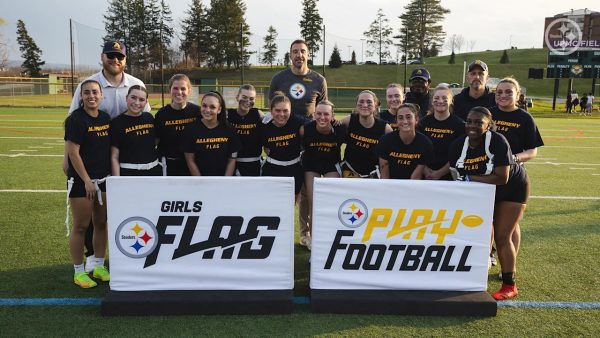Caballero, Knupsky receive grant for exploring interdisciplinary education
Two professors received a grant for their work exploring whether a student’s Allegheny College education is too one-dimensional.
Soledad Caballero, associate professor of English, and Aimee Knupsky, associate professor of psychology, won a Humanities Connections Planning grant from the National Endowment for the Humanities to explore ways to expand interdisciplinary teaching at Allegheny.
The grant connects to a six-year interdisciplinary teaching and research partnership Caballero and Knupsky have developed with the aid of two other grants. Caballero and Knupsky have developed their partnership through a shared interest in the Age of Wonder, which occurred from late 1700s into the 1800s, and which Knupsky said was characterized by significant overlap between humanistic and scientific disciplines.

“You had poets who were going to medical classes, watching lectures on anatomy, and using that information to inform the kinds of imagery they used in their poems,” Knupsky said. “And then you had philosophers, aka scientists, who were studying things like laughing gas, and inviting their poet and artist friends to join them for these experiments, maybe sometimes even the philosopher or the scientist writing poems in their lab books.”

Yet Knupsky said she and Caballero thought liberal arts institutions such as Allegheny, which have historically found pride in maintaining such overlap among disciplines, had hardened distinctions between aspects such as the humanities and natural sciences. Students became increasingly focused on their majors, and less frequently explored a truly interdisciplinary education.
“When we think about liberal arts, we think about exposing students to lots of different ways of knowing, so not just through a scientific lens, but through a humanistic lens, and there are lots of ways to ask questions about the world,” Knupsky said.
Thus, Caballero and Knupsky applied for their first grant, from the Great Lakes Colleges Association, a group of 13 liberal arts colleges of which Allegheny is a member.
Caballero and Knupsky first focused their interdisciplinary efforts on the topic of emotions. Knupsky was leading research focused on how emotions impacted reception and processing of stimuli, while Caballero was studying emotions in literature.
“We spent a summer researching it together, learning about it together, so Professor Caballero was reading neuroscience and psychological articles about it with me, and I was reading poems and plays and novels with her, and so we were kind of teaching each other about emotion through our different areas of expertise,” Knupsky said.
One result of this partnership has been the class Interdisciplinary Studies 415 – Exploring Emotion, which Caballero and Knupsky plan to offer in the fall of 2019.
“This is a place where we are both in a classroom together teaching,” Knupsky said. “We design the readings together, the syllabus together, we grade together. And we ask students to try to do the same thing.”
Their second grant, also from the GLCA, was called an Expanding Collaborations grant, and required its recipient to develop a project spanning multiple GLCA schools. Caballero and Knupsky worked with faculty at Denison University, Kenyon College and Ohio Wesleyan University to enhance the selection of interdisciplinary courses offered at each institution. This partnership resulted in 10 interdisciplinary courses being taught among the three other partner schools.
Each course included student and faculty assessments designed to understand the perceptions of the participants about interdisciplinary learning throughout different stages of the course.
“We looked at how students defined interdisciplinary learning at the beginning of the semester, at the middle of the semester, at the end of the semester and six months later,” Knupsky said.
For the third grant, Caballero and Knupsky decided to focus specifically on how Allegheny approached interdisciplinary scholarship.
“It’s a big commitment for the institution, because it means instead of professor Caballero and I both teaching two different classes, we’re only teaching one class, so it takes away what we’re able to offer the institution,” Knupsky said.
The two professors plan to use the third grant to explore current interdisciplinary efforts at Allegheny and have developed a steering committee comprised of faculty members from around the college to assist in this stage.
“We are 12 folks, 12 faculty and staff, from all of the range from biology to global health, to women’s gender sexuality, to English, to religious studies. And then a representative from the Gateway,” Caballero said.
One steering committee initiative Knupsky highlighted was a plan to make it easier for students with double majors to combine their majors in their senior project.
“Right now, you kind of have to figure it out on your own with your faculty readers, it can be a different experience for different students, depending on who you’re working with and what departments it is,” Knupsky said. “We want to see if we can do anything to help standardize that a little bit.”
The steering committee also plans to assist academic advisers in helping students find courses outside their field which would make the student a better candidate for the student’s next job.
“If I’m a biologist, how can my faculty member help me think about humanities classes that might make me a better candidate for what I want to do after Allegheny?” Knupsky asked. “If I’m an Econ major, how might my faculty member help me think of some humanities classes that might make me a little more competitive when I go out in the job market?”
Knupsky highlighted the prestige of the grant, saying roughly 10 to 11 percent of applicants for such grants receive them.
“Even though monetarily, it’s just $35,000, so that’s not as much as other grants Allegheny has gotten, but it’s special in terms of it’s an opportunity to work with the National Endowment for the Humanities,” Knupsky said. “We want the community to know that we’re doing this work. The goal at the end of the year is if it looks like there’s interest for the kinds of things we’re exploring, we would apply for what’s called the Implementation Grant.”
Becky Dawson, assistant professor of biology and global health, was interested in joining the steering committee after she taught an interdisciplinary class with Barbara Shaw, associate professor of women’s, gender and sexuality studies. The course, called Sex and Health, discussed the concept of sex from both a scientific and a humanistic standpoint.
“I love spending time thinking and teaching and researching with someone who doesn’t think and teach and research the same way … so I love hearing what she does and hearing how she views my field,” Dawson said. “I love seeing the new space that we’re creating together.”








